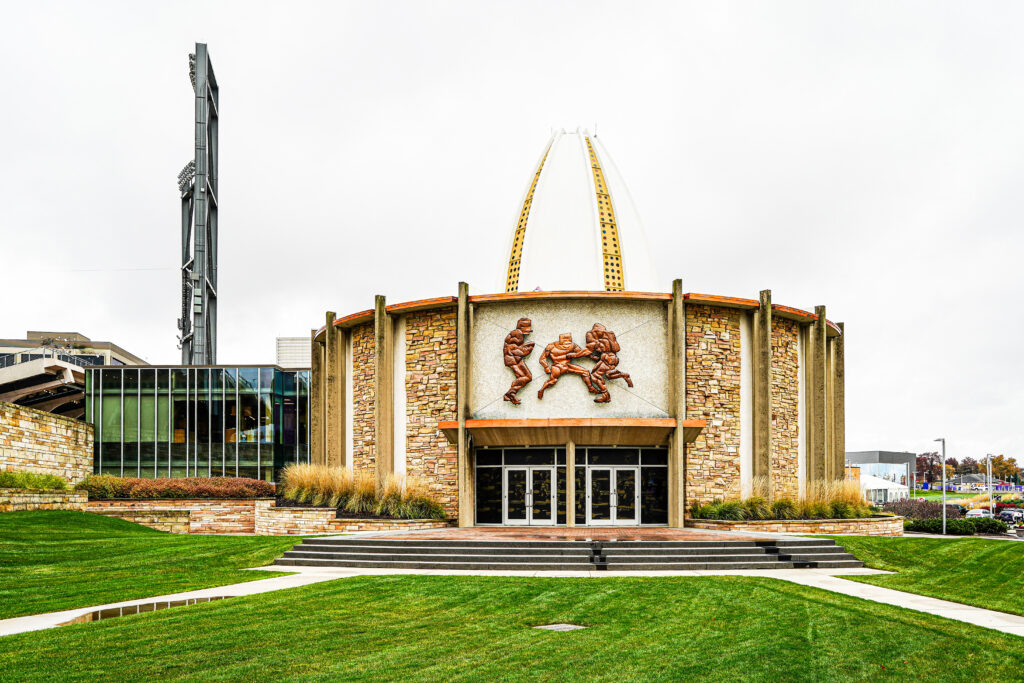
When Both Extremes Control the Agenda, Who Loses?

In the latest episode of Politics & Risk from The Council’s government affairs team, SVP Joel Kopperud interviews Democratic Rep. Brittany Pettersen, who has represented Colorado’s 7th Congressional District since 2023.
Having served in the Colorado state legislature for a decade prior to becoming a member of the U.S. House of Representatives, Pettersen shares the top issues for Coloradans, including housing and climate change. As a member of the Problem Solvers Caucus, Pettersen also dives deep into the systematic issues that Congress faces when getting work done.
Read the Transcript
Brittany Pettersen
People used to come to Washington, DC and move out here, and they got to know each other’s people. They would see each other at the grocery store. Their kids would play, you know, baseball together. And when all of us leave, and we immediately leave as soon as possible, what it does is it consolidates power for leadership. And when you get that consolidation of power, you’re not getting that broader engagement on key issue areas, and you’re not getting that bipartisan engagement.
Joel Kopperud
Hi, everyone. This is Joel Kopperud, senior vice president of government affairs here at the Council of Insurance Agents and Brokers. Thank you for dialing into our latest podcast, Politics and Risk, where we interview our favorite members of Congress and give them an opportunity to talk directly to you and so you can hear directly from them exactly what’s going on in Washington and what their view of the world is at this moment.
We’re honored to be joined this week by Congresswoman Brittany Pettersen. She’s from my home state of Colorado, and we’re just so happy to have you. You’ve got such a great reputation as a freshman member of Congress. I know you came in with a stellar background as a successful legislator, strong, bipartisan president of state legislature, working closely with Republicans.
I know healthcare is, and mental health is a very big passion of yours. We care a lot about healthcare issues. So it’s great to have someone like you who is a centrist politico in Washington trying to build out the political center and focus more on getting things done. So welcome to the podcast.
Brittany Pettersen
Great. Thanks so much for having me, Joel.
Joel Kopperud
You know, our parochial interests in the insurance industry and the brokerage industry are lie in the political center. And when the extremes control the agenda, we lose. The business community at large loses. It’s so good to have members like you part of the problem Solvers Caucus focused on getting things done. But I know being a member of the problem Solvers Caucus doesn’t come without its trade offs, and it can sometimes be a thorn in the side of leadership, which is part of, I think, the intention of the problem Solvers Caucus. But can you talk a little bit about what your experience has been like? What have you really gained politically in terms of getting things done? Has it been helpful in building relationships with Republicans? Have they had a lot of accomplishments in this Congress?
Brittany Pettersen
Well, and, you know, unfortunately, we have historic dysfunction, and so a lot of things aren’t getting done. But what gives me hope about the problem Solvers Caucus is it’s the one place where we actually come together and Democrats and Republicans get to work together, have conversations. I know that this sounds ridiculous when you think about it, because it should be happening everywhere. That’s what, you know, the state legislature, I was constantly working with my republican colleagues on committee, sitting next to each other. We were engaging on the floor. Most of our bills were bipartisan. So it’s really the Colorado way. And when you come to Congress, we’ve all heard about the dysfunction. But I can tell you that there’s systemic issues on what sets us up for failure and things that we need to address in the long term.
But the problem Solvers caucus has been important for me in getting to know other members that I don’t have the opportunity to talk to often. And that’s part of the systemic issues that we have. I do think there have been bills that we’ve all supported that have come through the problem solvers, that have made it past the House, and then it goes the Senate, which is another unique dynamic, overcome sometimes. But I think that, you know, I’m still grateful to be a part of a group of people who actually want to roll up their sleeves and get to work.
Joel Kopperud
You talked about the systemic issues that keep things from getting done. What are, what are you talking about specifically?
Brittany Pettersen
So, you know, over the years, I think if we look back at how bad Congress is now, we can point to a lot of things like, you know, rewarding people who say the craziest thing because they get all over tv, they become well known, raise lots of money, and it creates a bad incentive there. But also, there are things that happened, especially under Newt Gingrich, that are very difficult to bring bipartisan compromises. Some of those are, the discharge petition used to be anonymous, and so it would force leadership on both sides to come to the table for an agreement because they knew if the vote came to the floor that the moderates would come to the table and pass something that maybe they wanted to leverage their power to influence what was going to happen.
And under Newt Gingrich, he made it so that was not the case. And so you never have the opportunity to actually come to the table where you’re not scrutinized on either the far left or the far right for something that might be perceived. You can pull out the imperfections of a bill, but governing, you know, our entire system was built off of us having to actually come together to solve problems and give and take. That is, we can’t govern and move things forward if we’re unable to do that. And so that’s one of the big things. He also brought he brought videos to the House floor, to the committee hearings. And I know that, Joel, you’ve sat through plenty. These committee hearings are supposed to be a time where you get to actually meet with experts, ask questions, dive into a bill.
Unfortunately, it’s about people getting their five minutes to try to get on tv and trying to get their YouTube clip. And so it’s really changed, I think, that dynamic. And then another thing that he did was he said, members need to go home and you need to be in your district and not in DC. And people started getting primaried if they moved to Washington, DC. Now I want to live in Colorado. I have a little four year old boy at home, and I want him to grow up in Colorado. But that shouldn’t be a political pressure, and that shouldn’t be the standard. People used to come to Washington, DC and move out here, and they got to know each other’s people. They would see each other at the grocery store, their kids would play baseball together. They actually got to know each other’s people.
When all of us leave, and we immediately leave as soon as possible, what it does is it consolidates power for leadership. And when you get that consolidation of power, you’re not getting that broader engagement on key issue areas and you’re not getting that bipartisan engagement.
Joel Kopperud
Yeah, exactly. Everything in life is about relationships and relationship building, and it just seems increasingly difficult to do that in this environment. You talked about the committee hearings and how everyone wants their moments to go viral. That’s something that drives me crazy.
Brittany Pettersen
And it has, oh, my gosh, it’s so uncomfortable.
Joel Kopperud
You just took a really interesting vote to save the republican speaker of the House. I know everyone watched all of that unfold in the mainstream press. It’s a fascinating moment because one hand, everyone in the media, they put it in the context of, oh, Republicans can’t even support their own majority, they’re their own leader, blah, blah. Democrats had to bail them out. But on the other hand, which no one talks about, it looks almost like a bipartisan vote. And we’re seeing actually everything that comes out of the House of Representatives gets democratic votes, if not majority of democratic votes. Is this, is this a bipartisan effort that’s just getting twisted into the dysfunctional dialogue that’s taking over? Or is it truly dysfunctional and Democrats are controlling the House?
Brittany Pettersen
Controlling the House? I don’t, I would, I don’t, I wouldn’t go that far. Because, first of all, this is the most dysfunctional congress in the history. And if were in control of the House, we would be governing, and we wouldn’t have been playing the political games that we’ve been seeing here for the last year and a half with literally threatening to send our economy off a cliff for political agendas, sending our economy into a tailspin by having long term detrimental effects, by even talking about the threat of not passing a budget and funding our government has, we anticipate at least a billion dollars of investment going elsewhere because people across the globe don’t know if the United States is going to pay our bills. So this has detrimental effects in the long term.
Even though were finally able to pass the budget under government, the political tactics that were used are absolutely unacceptable. And so it has been very frustrating to watch us shoot ourselves in the foot when there are so many urgent issues and needs for our country. What’s happening globally that we can’t actually come to the table and work together. And, yes, we need to get our budget in control, and that also means coming together in a bipartisan way to talk about revenue, not just what we’re spending, but the very wealthy, who, unfortunately, have been prioritizing getting tax breaks that we can’t afford as a country. So, you know, these conversations are what we need to be having in a bipartisan way.
And those tactics were horrendous, I would say, you know, in the Democrats have been critical and actually doing the things, passing the things that we needed to govern and not throw our economy off of a cliff. But I would definitely not say that we are in control because it would look a lot different for the country and the issues that we’re addressing.
Joel Kopperud
Two quick legislative questions for you. What do you see on the legislative horizon for this year in terms of actually getting done? And can you give us a quick update on safe banking? We care deeply about allowing the financial services industry to offer our services to the cannabis industry, and they should have access to competitive markets just like every other small business has access to them. So can you give us a brief update on those two issues?
Brittany
I think that right now, one of the must pass bills that we have to get done this year that’s outstanding is the NDAA. So we need to actually fund our military and hopefully can come together to do so. The farm bill is being marked up in committee soon, but this is something that we don’t anticipate it actually coming to the floor because it has such huge cuts to critical need areas. And I don’t think that we can get enough, they can get enough support to get it through the finish line in both the House and the Senate. So unless they’re willing to come to the table on that, I don’t know if the farm bill will happen this year.
I still have, in the long term, big things that I want to get done and that I know we can do here in the House and what we need to address for the urgent needs of our country. But right now, it’s kind of like trying to hold things together with Band Aids. It’s with duct tape. Just trying to get through, hopefully to new leadership for the House is, you know, it’s, I, I don’t have high hopes on additional things that we’re going to get to pass this year, but of course, we’ll still be working across the aisle to try to get that done. It’s just been, it’s been an incredibly unnecessarily frustrating experience with the leadership in the House. Safe banking is common sense. This is another thing that we can’t actually come together on this. It’s just very frustrating.
I want to give a shout out to Ed Perlmutter for leading on this for so many years. And I serve in his previous seat, which is such an honor. But safe banking is common sense legislation. It’s essential to pass for Colorado businesses. It really is about the safety of employees as well. So I am hopeful. You know, McHenry, Chairman McHenry is very, he’s open minded. He’s approachable. While this hasn’t been a top priority for him, you know, he seems willing to listen. I think he has supported it in the past. I don’t know. You would know better than I do, Joel. But, you know, we’re going to still keep pushing to get this done. It’s just that there’s not a lot of things that are going to be passing the House.
We’re going to go into appropriation season again, even though we just finally passed the previous year’s appropriation bills. And I’m guessing this will end with just a continuing resolution before we get past the election.
Joel Kopperud
Quick last two questions for you, and we ask these questions of every member that joins our podcast. What’s the number one issue that you’re hearing about from your constituents, and what’s your favorite, who’s your favorite member of Congress on the other side of the aisle to work with?
Brittany Pettersen
Well, you know, my background in the state legislature was around public education and public health. I worked a ton on the opioid epidemic. And when I was running for office two years ago, no matter what community I went into, the number one concern or who I was talking to was housing and the cost of housing. And so when I was elected and asked what committee I wanted to be on, I asked to be on financial services because of the housing and insurance subcommittee and very lucky to be sitting on that. The housing supply is one of those urgent needs that we should be able to come together on.
It does take spending money upfront, but you save unbelievable costs in the end by making sure that people have a roof over their head and can afford to live in their communities and that businesses are able to hire and retain workers. And, you know, this has such a domino effect and impacts across Colorado, but also the United States. That’s what I hear. Also tied to that is the rising cost of insurance. We know that climate change is creating huge increase in costs for replacing roofs from hail damage, wildfires, you name it. In Colorado, that is a big hit to families. Access to childcare and early childhood education. These are also some of those big cost drivers when people are the most vulnerable.
So those are the big inflationary needs, I would say, you know, of course, costs of health care as well, and access, especially in the rural parts of the state. And we have a lot of seniors in my district in Jefferson county, which is just to the north of all of you, about an hour it is. We have this year it’s going to be, I believe it’s 60% of the population will be over 60. So we have a lot of seniors who also don’t have housing who are dealing with, you know, we don’t have the population coming up to meet the needs. So workforce is a huge issue. It impacts everything that we do in Colorado and across the United States. We need common sense immigration reform, which includes legal pathways for people to work here.
And that would actually be the number one thing we could do to bring down rising costs.
Joel Kopperud
And who is your favorite member of Congress on the other side of the aisle to work with on these issues?
Brittany Pettersen
So representative flood is on my committee, and we’ve done lots of work together on bills, and he’s somebody who actively reaches out, you know, to try to build those relationships. We’ve had breakfast. We’ve met with another group for dinner. And so it really does take making that effort to reach out and get things scheduled with members across the aisle because you’re just never usually participating in the same things. And that’s another thing that we have to fix.
Joel Kopperud
Brittany, thank you so much for joining us. Thanks so much. Thank you, Joel, for all you do. It’s great working with you. And we look forward to working with you for years to come.
Brittany Pettersen
Yes, well, I’m so grateful to be with you. And I want to tell you all, you are well represented with Joel, so he makes sure that we have all of the up to date information so that we can be the best advocates.




